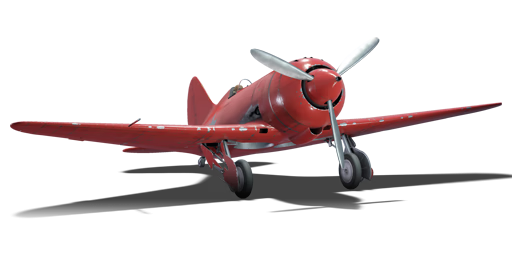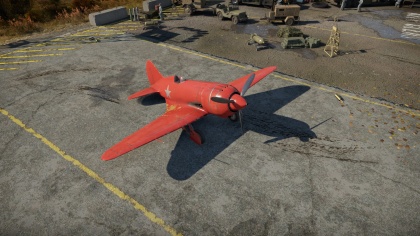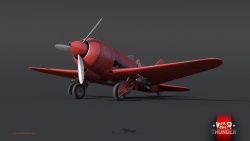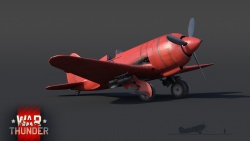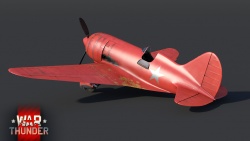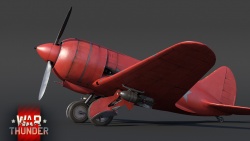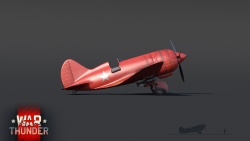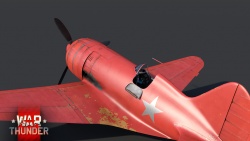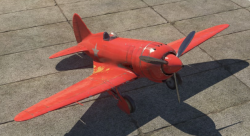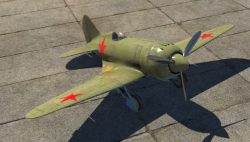Difference between revisions of "I-180S"
(Edits.) |
|||
| Line 268: | Line 268: | ||
* [https://warthunder.com/en/news/6136-development-i-180s-sky-acrobat-en [Devblog<nowiki>]</nowiki> I-180S: Sky Acrobat] | * [https://warthunder.com/en/news/6136-development-i-180s-sky-acrobat-en [Devblog<nowiki>]</nowiki> I-180S: Sky Acrobat] | ||
| + | {{AirManufacturer Polikarpov}} | ||
{{USSR fighters}} | {{USSR fighters}} | ||
{{USSR premium aircraft}} | {{USSR premium aircraft}} | ||
Revision as of 21:19, 31 December 2019
Contents
Description
The I-180S is a premium rank II Russian fighter
with a battle rating of 3.0 (AB/RB/SB). It was introduced in Update 1.87 "Locked On" during the "Battlefield Engineer" event.
General info
Flight performance
Describe how the aircraft behaves in the air. Speed, manoeuvrability, acceleration and allowable loads - these are the most important characteristics of the vehicle.
| Characteristics | |||||||
|---|---|---|---|---|---|---|---|
| Stock | |||||||
| Max Speed (km/h at 6,500 m) |
Max altitude (meters) |
Turn time (seconds) |
Rate of climb (meters/second) |
Take-off run (meters) | |||
| AB | RB | AB | RB | AB | RB | ||
| 565 | 547 | 10000 | 19.5 | 20.6 | 12.6 | 12.6 | 350 |
| Upgraded | |||||||
| Max Speed (km/h at 6,500 m) |
Max altitude (meters) |
Turn time (seconds) |
Rate of climb (meters/second) |
Take-off run (meters) | |||
| AB | RB | AB | RB | AB | RB | ||
| 607 | 585 | 10000 | 18.5 | 19.0 | 21.5 | 16.6 | 350 |
Details
| Features | ||||
|---|---|---|---|---|
| Combat flaps | Take-off flaps | Landing flaps | Air brakes | Arrestor gear |
| ✓ | ✓ | ✓ | X | X |
| Limits | ||||
|---|---|---|---|---|
| Wing-break speed (km/h) |
Gear limit (km/h) |
Combat flaps (km/h) |
Max Static G | |
| + | - | |||
| 420 | ~12 | ~6 | ||
| Optimal velocities | |||
|---|---|---|---|
| Ailerons (km/h) |
Rudder (km/h) |
Elevators (km/h) |
Radiator (km/h) |
| < 330 | < 320 | < 420 | > 190 |
| Compressor (RB/SB) | ||
|---|---|---|
| Setting 1 | ||
| Optimal altitude | 100% Engine power | WEP Engine power |
| 4,000 m | 1,100 hp | 1,274 hp |
| Setting 2 | ||
| Optimal altitude | 100% Engine power | WEP Engine power |
| 6,000 m | 1,000 hp | 1,158 hp |
Survivability and armour
- 8 mm Steel - Pilot's seat
Armaments
Offensive armament
The I-180S is armed with:
- 2 x 12.7 mm Berezin UB machine guns, nose-mounted (220 rpg = 440 total)
- 2 x 7.62 mm ShKAS machine guns, nose-mounted (650 rpg = 1,300 total)
Suspended armament
The I-180S can be outfitted with the following ordnance:
- Without load
- 4 x 50 kg FAB-50 bombs (200 kg total)
- 2 x 100 kg FAB-100 bombs (200 kg total)
Usage in battles
Climb to about 4,000m - 5,000m of altitude at the beginning of the battle, use Boom & Zoom tactic to get rid of some enemies low first. If there are any enemies above or as high as you, try to drag them into a dogfight. Remember to always avoid head-on attacks when against some heavy armed planes such as the F4U Corsair variants, P-40s and Fw 190s.
There are also some enemies you really have to pay attention to, specifically the British Spitfires and Japanese A6M. Both of these fighter types have a very good turn rate, which means dogfighting even against a mediocre pilot will most likely result with them on your tail. Remember when fighting against them the Spits and Zeros, try to gain an altitude advantage or do a head-on with a quick snap-turn and out-run them.
Manual Engine Control
| MEC elements | ||||||
|---|---|---|---|---|---|---|
| Mixer | Pitch | Radiator | Supercharger | Turbocharger | ||
| Oil | Water | Type | ||||
| Controllable | Not controllable Not auto controlled |
Controllable Not auto controlled |
Controllable Not auto controlled |
Separate | Controllable 2 gears |
Not controllable |
- Manual activation
- For those who manually activate the gearing, switch to second gear around 3,500 meters and drop the drop climb angle to 10-12 degrees which will make most effective use of the aircraft's engine and supercharger.
Modules
| Tier | Flight performance | Survivability | Weaponry | |||
|---|---|---|---|---|---|---|
| I | Fuselage repair | Radiator | Offensive 7 mm | |||
| II | Compressor | Airframe | Offensive 12 mm | Der-31 | ||
| III | Wings repair | Engine | New 7 mm MGs | |||
| IV | Engine injection | Cover | New 12 mm MGs | |||
Pros and cons
Pros:
- Great all-round fighter, a bit of turn fighter, a bit of Boom & Zoomer
- Excellent climb rate due to supercharger
- Tight aircraft with great manoeuvrability
- Great armament packed tightly in the nose of the aircraft
Cons:
- Engine tends to overheat, must be careful with WEP
- Poor rudder control, difficult to perform wing-overs or hammerhead manoeuvres
History
Development of the I-180 began in 1938, with the Polikarpov design bureau starting work on creating a new aircraft to meet the requirements of the Soviet Air Force at the time. In order to do so, engineers decided to base the new machine on a modified I-16 design and to install a more powerful radial engine. As a result, the I-180 was created. However, development and testing of prototypes was plagued with numerous issues, including many accidents. This, coupled with the arrival of new Soviet fighter designs quickly cast a shadow on the I-180 project which ultimately led to the project being cancelled by the end of 1940. Prior to the cancellation, a production version of the machine - the I-180S - was built but only in very limited numbers. In total, around 13 I-180s were built, including prototypes, but none saw any active service.
- From Devblog
Media
- Images
See also
Links to the articles on the War Thunder Wiki that you think will be useful for the reader, for example:
- reference to the series of the aircraft;
- links to approximate analogues of other nations and research trees.
External links
| Polikarpov Design Bureau (Опытное конструкторское бюро Поликарпова) | |
|---|---|
| I-15 | I-15 WR · I-15 M-22 · I-15 M-25 · I-15bis · Krasnolutsky's I-15bis |
| I-153 | I-153 M-62 · Zhukovsky's I-153-M62 · I-153P |
| I-16 | I-16 type 5 · I-16 type 10 · I-16 type 18 · I-16 type 24 · I-16 type 27 · I-16 type 28 |
| I-180 | I-180S · I-185 (M-71) · I-185 (M-82) |
| ITP | ITP (M-1) |
| Twin-engine fighters | TIS MA |
| Bombers | Po-2 · Po-2M |
| Export | ␗I-15bis · ␗I-153 M-62 · ␗I-16 type 5 · ␗I-16 type 10 · ␗I-16 type 17 · ␗I-16 Chung 28 |
| USSR fighters | |
|---|---|
| I-15 | I-15 WR · I-15 M-22 · I-15 M-25 · I-15bis · Krasnolutsky's I-15bis |
| I-153 M-62 · Zhukovsky's I-153-M62 · I-153P | |
| I-16 | I-16 type 5 · I-16 type 10 · I-16 type 18 · I-16 type 24 · I-16 type 27 · I-16 type 28 · I-180S |
| I-29 | I-29 |
| I-185 | I-185 (M-71) · I-185 (M-82) |
| I-225 | I-225 |
| ITP | ITP (M-1) |
| MiG-3 | MiG-3-15 · MiG-3-15 (BK) · MiG-3-34 |
| LaGG | I-301 · LaGG-3-4 · LaGG-3-8 · LaGG-3-11 · LaGG-3-23 · LaGG-3-34 · LaGG-3-35 · LaGG-3-66 |
| La | La-5 · La-5F · La-5FN · La-7 · Dolgushin's La-7 · La-7B-20 · La-9 · La-11 |
| Yak-1/7 | Yak-1 · Yak-1B · Yak-7B |
| Yak-3 | Yak-3 · Eremin's Yak-3(e) · Yak-3P · Yak-3T · Yak-3U · Yak-3 (VK-107) |
| Yak-9 | Yak-9 · Yak-9B · Golovachev's Yak-9M · Yak-9T · Yak-9K · Yak-9U · Yak-9UT · Yak-9P |
| Other countries | ▂P-40E-1 · ▂P-47D-27 · ▂Hurricane Mk IIB · ▂Fw 190 D-9 · ▂Spitfire Mk IXc |
| P-39 | ▂P-39K-1 · ▂Pokryshkin's P-39N-0 · ▂P-39Q-15 |
| P-63 | ▂P-63A-5 · ▂P-63A-10 · ▂P-63C-5 |
| USSR premium aircraft | |
|---|---|
| Fighters | Krasnolutsky's I-15bis · I-16 type 28 · Zhukovsky's I-153-M62 · I-153P · I-180S · I-301 · ITP (M-1) |
| LaGG-3-4 · LaGG-3-23 · LaGG-3-34 · Dolgushin's La-7 · La-11 | |
| Eremin's Yak-3(e) · Yak-3 (VK-107) · Yak-3T · Golovachev's Yak-9M | |
| ▂P-39K-1 · ▂Pokryshkin's P-39N-0 · ▂P-39Q-15 · ▂P-40E-1 · ▂P-47D-27 · ▂P-63A-5 · ▂P-63A-10 · ▂P-63C-5 | |
| ▂Hurricane Mk IIB · ▂Spitfire Mk IXc · ▂Fw 190 D-9 | |
| Twin-engine fighters | I-29 |
| Jet fighters | Su-11 · MiG-15bis ISh · MiG-17AS · MiG-21S (R-13-300) · MiG-23ML |
| Strike aircraft | IL-2M "Avenger" · IL-2 M-82 · IL-8 (1944) · Su-6 · Tandem MAI · TIS MA · Su-8 · Tu-1 |
| Yak-38 · Su-7BMK · Su-25K · Su-39 | |
| Bombers | Po-2M · Be-6 · MBR-2-M-34 · Pe-2-205 · TB-3M-17-32 |
| ▂PBY-5A Catalina · ▂Hampden TB Mk I · ▂A-20G-30 · ▂B-25J-30 | |


